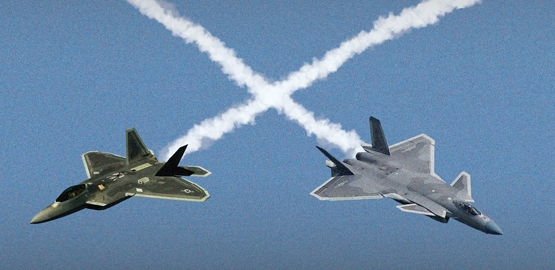News
Preparing for Attack by Precision-Guided Missiles
The US military "has become accustomed to assuming" its opponents either can't strike US bases and forces overseas with precision, or don't have the capacity to overwhelm US defenses, but "neither of these assumptions are correct today," Mark Gunzinger, a senior fellow at the Center for Strategic and Budgetary Assessments, said Friday.
No Silver Bullet
Preparing for future salvo competitions will require a "system of systems" approach, Bryan Clark, a senior fellow at the Center for Strategic and Budgetary Assessments, said Friday in Washington, D.C. "There is no one silver bullet that is going to solve the missile defense challenge" the US is facing, Clark said. Defeating large precision-guided missile salvos will require kinetic defenses, non-kinetic defenses, and battle management systems, Clark and co-author Mark Gunzinger said in a report called, "Winning the Salvo Competition: Rebalancing America's Air and Missile Defenses."
CSBA: Shorter-Range Missile Defense Equals Bigger Savings
The U.S. Navy could save money by shifting its missile-salvo defensive anti-air warfare (AAW) strategy away from long-range interceptors and toward medium-range surface-to-air interceptors, hypervelocity projectiles, directed energy weapons and electronic warfare systems, according to the Center for Strategic and Budgetary Assessments (CSBA).
Zumwalt Brings Mix of Challenges, Opportunities to Fleet
Given the low radar cross section and the ship’s ability to operate close to shore, Zumwalt could conceivably be a credible special operations insertion platform like how the service uses its guided missile and attack submarines, Bryan Clark, a naval analyst at the Center for Strategic and Budgetary Assessments and former aide to retired Chief of Naval Operations Adm. Jonathan Greenert, told USNI News last week. “Originally because the class had this focus on the littoral, it seems like there was always some expectation that they may do special ops off the ship. It’s always been focused on littoral environments and some of those things were baked in at the beginning,” Clark said. The additional features the Navy has added over the last ten years appeared to have increased the special mission emphasis.
A New Coast Guard Icebreaker Is a Decade Away. A Lawmaker Says That’s Too Long.
To get up to speed, the Navy could join the Coast Guard's icebreaker acquisition program to provide ship design oversight and production management. It took this step in the early 2000s when the Coast Guard began its national security cutter program, according to a defense expert with the Center for Strategic and Budgetary Assessments in Washington, D.C.
The Making of an Arms Race: A Buildup of Defense Capabilities to Counter Russian Aggression Has Begun at the Pentagon
Fighting right up to the line that would clearly trigger a Western response is known as “grey zone conflict,” says Bryan Clark, a senior fellow at the Center for Strategic and Budgetary Assessments, a defense think tank that has run several war games with Eastern European nations. “They’re doing a very good job of playing at the edges,” he says of the Russians. Because an obvious U.S. military response may not be considered desirable in such circumstances, there is a premium now on developing U.S. systems that can ght as surreptitiously as Russia does, by disrupting their military command and control with electronic warfare and cyberattacks, Clark says…So the Pentagon is investing more in ground-based missile systems with names such as the Long Range Precision Fires and the Multi-Mission Launcher that are not as easily detected as aircraft and can get closer to enemy targets, Clark says. The propensity of Putin to fight right up to the line that could trigger U.S. military involvement and the way Russia’s long- range air defenses are keeping U.S. forces at bay “are the two big military challenges the U.S. is just now coming to grips with,” Clark says.























